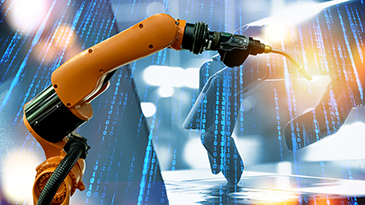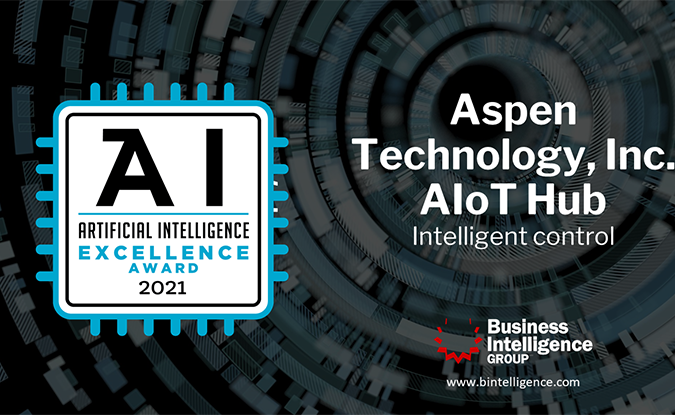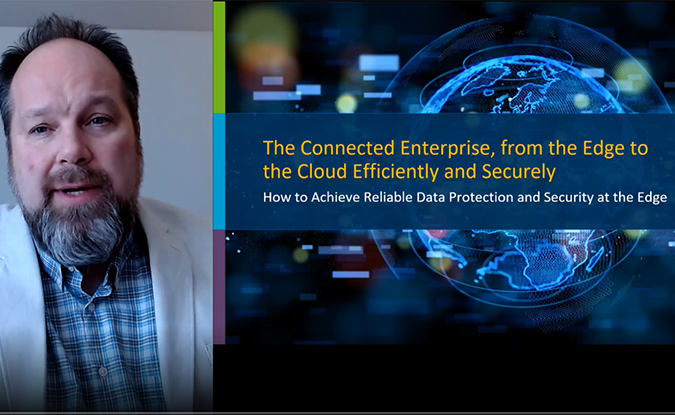This week at AspenTech’s premier global event for industrial executives, OPTIMIZE 2021, Bill Scudder, SVP and GM of the AIoT Solutions team at AspenTech explained how the confluence of AI and the Industrial Internet of Things (IIoT) would accelerate the digitalization journey across capital-intensive industries. The session began by explaining how the award-winning Aspen AIoT Hub™ provides the integrated data management, edge and cloud infrastructure, and a production-grade AI environment to build, deploy and host Industrial AI applications at enterprise speed and scale – and power the digital industry of the future.
The presentation delved into how the next generation of enterprises will need to navigate the market volatility, deliver on sustainability and profitability goals, adapt to the tectonic workforce shifts, all while accelerating the digital transformation of their industries to run safer, greener, longer and faster.
How AIoT Can Be Your Competitive Advantage
Bill went onto explain how the Aspen AIoT Hub helps the self-optimizing plants of the future leverage industrial data to create a sustainable competitive advantage by:
- Analyzing large volumes of industrial data for real-time reporting, automation and decision making
- Integrating data across assets, plants and sites to facilitate an enterprise-wide Industrial AI strategy
- Visualizing data to identify trends, outliers and patterns to drive mission-critical apps and actionable business workflows
- Collaborating on AI-powered apps between domain experts and data scientists by leveraging the Industrial AI Workbench to enable safety, sustainability and profitability goals.
An Industrial AI Strategy is Key to Overcoming Barriers to Adoption
Also discussed were the results of a targeted survey that AspenTech recently conducted to assess how AI adoption was happening with industrial customers. Through research and by talking to our customers, we learned that:
- Increased productivity is by far the biggest benefit of AI for those surveyed
- Lack of confidence, lack of skills, and cost are barriers to adoption
To overcome the AI adoption hurdle, there needs to be increased emphasis on democratizing the application of AI to domain-specific industrial challenges with a focus on business outcomes.
The key to making AI work in real-world applications is getting the learning right — and more importantly, making it valuable and actionable in an industrial business context. Therefore, the development of AI-enabled applications needs to be purposefully guided by domain knowledge to derive real business value and enable measurable ROI.
This is where we get to the paradigm of Industrial AI, which combines data science and AI with software and domain expertise to deliver comprehensive business outcomes for the specific business needs of these capital-intensive industries.
The presentation further discussed how the AIoT Hub provides a cloud-ready and built-for-industry Industrial AI infrastructure designed to unlock the immense value from data assets. It outlined the key benefits and capabilities of a successful AIoT strategy as well as shared an AIoT Hub architecture blueprint of how such a solution would work across the organization.
AIoT is an Evolution… Not a Revolution
So, how do we unlock the value of industrial data when AI meets IIoT? For starters, AIoT is an evolution, not a revolution. Bill articulately highlighted the four AIoT drivers for the industry of the future:
- First, next-generation Industrial AI software will need to interpret, and often predict, using deep analytics and machine learning techniques, transforming industrial data into business outcomes – across the full asset lifecycle. This class of software will be designed for the upcoming workforce, with new-age expectations on interactions… these solutions will be intuitive, agile, AI-rich and lower the barrier to learning more than ever before.
- Second, a pervasive AIoT strategy would need to underpin the foundation of an Intelligent Industry driven by more connected devices and great volumes of diverse data. This means getting the right data to the right person at the right time would be key to the intelligent industry of tomorrow. This notion is further compounded by the impact of technologies such as 5G, Industrial AI, big data, intelligent edge, smart machines and robotics.
- Third, the rise of semi-autonomous assets and processes would mean that manufacturing machines would operate, maintain and sustain themselves without much human help. These will be enabled with networks of communication that allow assets to collaborate, adapt and optimize based on conditions and feedback.
- And finally, human-machine collaboration would combine the experience and cognitive abilities of the human with the strength, dependability, reach and endurance of robots will fuel a wide range of new robotic applications.
A Vision for the Industry of the Future
Next-generation, AI-powered applications augment the value of existing software solutions and help companies transcend functional silos within the enterprise to drive greater productivity, efficiency and reliability across their operations. Here are three examples that show how industrial organizations can leverage the Aspen AIoT Hub to make Industrial AI strategy a reality:
1. A refinery can apply Industrial AI technology to simultaneously evaluate thousands of different scenarios to identify the optimum crude oil slate for processing. Coupled with the cognitive capabilities to improve decision-making and ease-of-use, the Aspen AIoT Hub frees up planning personnel to focus on more strategic tasks.
2. A process plant can deploy an advanced class of Industrial AI-enabled models that combine machine learning and first principles to deliver more comprehensive, more accurate, and more performant models. The task is complex, but a tried-and-true formula can help move faster and with limited resources, —without you needing to become an AI expert or have experts with decades of modeling expertise on your staff. These models democratize AI across asset applications to optimally design, operate and maintain assets and provide a better representation of the plant, keeping the model more relevant over a more extended period.
3. A chemical plant can leverage Industrial AI to gain real-time demand insights from customers to boost its supply chain networks. Supply chain and operations technologies are seamlessly linked together to create a system that detects changes in market conditions and automatically adjusts the operating plan and schedule in response.
Aspen AIoT Hub: Harnessing Enterprise-wide Industrial Data Value
The key takeaway of Bill Scudder’s presentation is that AspenTech offers an end-to-end, purpose-built solution with the Aspen AIoT Hub that is not a collection of generic tools and services from multiple third parties. The Aspen AIoT Hub is scalable, secure and robust and can handle the influx of demand, increased productivity, changing trends and evolving needs of any organization. He walked through a detailed use case that illustrated how the various applications and capabilities supported by the Aspen AIoT Hub enabled the diverse personas across an industrial organization – data analysts, process engineers, data scientists and enterprise users - with the power and value of industrial data.
This is the result of AspenTech’s 40+ years of experience combining our deep domain knowledge with the latest advances in AI and machine learning. It’s what helps us pave the way for organizations to create the Self-Optimizing Plant of the future. Using Aspen AIoT Hub, customers are able to focus on value-driven, forward-looking activities rather than manually processing data and generating reports. And they are achieving meaningful results today.
It's not too late to register for OPTIMIZE 2021. Our virtual event provides on-demand viewing for sessions already run, and one more day of new, exciting sessions Thursday, May 19.





Leave A Comment